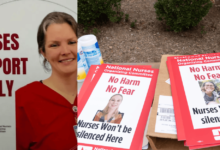NHS introduces paid leave for staff who miscarry

A scheme which offers NHS staff who miscarry, as well as their partners, additional paid leave has been rolled out nationally.
The now-national guidance issued by NHS England states that women who suffer a miscarriage in the first 24 weeks of pregnancy will be given up to 10 days paid leave to help “heal from the trauma of pregnancy loss”.
“We know the significance of getting support right in the very first instance for our staff”
Navina Evans
Partners of women who miscarry will also be offered up to five days. The policy stated that women who experience a loss after the six month mark will still be eligible for paid maternity leave.
This new policy was first trialled at Birmingham Women’s and Children’s NHS Trust, and a similar one was implemented by Humber Teaching NHS Foundation Trust in 2023 as part of a series of improvements to maternity and paternity leave.
Raffaela Goodby, chief people officer at Birmingham Women’s and Children’s, said she hoped the policy would be adopted across the UK – not just England – and “drive positive change”.
Ms Goodby added: “Structured support at work for people experiencing miscarriage can have a lifelong impact on the people involved.
“I hope policies like this become the norm for the NHS and I am grateful to staff side, NHS England, Tommy’s and the Miscarriage Association for their energy and support.”
According to NHS England, around one in four pregnancies end in miscarriage and research in 2020 found that roughly a third of women develop post-traumatic stress disorder (PTSD) after an early pregnancy loss.
Birmingham Women’s and Children’s found that offering additional support, such as the paid time off, to women who miscarry and their partners aided staff retention and improved their wellbeing.
Kath Abrahams, chief executive of Tommy’s, a baby loss and pregnancy research charity, said the NHS was “sending a powerful signal” to staff who may be struggling.
“We’re delighted to stand with NHS England as they introduce this ground-breaking policy,” said Ms Abrahams.
NHS England’s new advice will also ask trusts to allow staff to take paid time off to attend medical examinations, tests, scans, mental health interventions and other appointments relating to pregnancy.
Further, trusts are advised to offer staff returning after a miscarriage referrals to specialist miscarriage and baby loss charities, as well as other occupational health services.
NHS England chief workforce, training and education officer Dr Navina Evans said of the new national policy: “Baby loss is an extremely traumatic experience that hundreds of NHS staff experience each year, and it is right they are treated with the utmost care and compassion when going through such an upsetting experience.
“We know the significance of getting support right in the very first instance for our staff, which is why for the first time in the healthcare sector we are providing paid leave so parents can take time out to process this traumatic experience as well as paid time to attend appointments.
“I hope that this formal guidance will see other sectors in the UK adopt such supportive approaches to miscarriage in their own organisations – and if you have experienced baby loss, please come forward to one of our bereavement services which have been rolled out nationally, from this month”.
Minister for women’s health strategy Maria Caulfield added: “Our brilliant NHS workers look after us when we need it most and this new guidance is a positive step towards ensuring they are supported through the tragedy of losing of a baby.
“It means doctors, nurses and their partners will now be entitled to additional leave to help process their grief, which is crucial to their long-term mental health and wellbeing.
“This delivers on key recommendations made in the pregnancy loss review and is part of our efforts to improve women’s health through the women’s health strategy.”
Ms Caufield added that the government may announce “further support measures” around maternity and paternity leave, as well as for women who miscarry and their partners.






